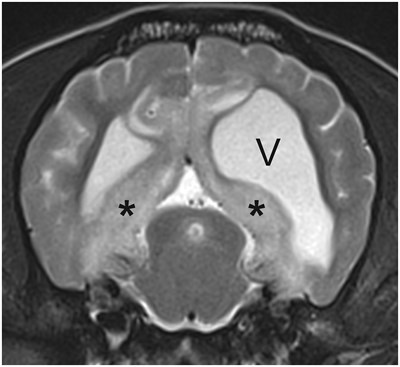Manuscript about Brain Inflammation in Dogs Published in PLOS ONE
Dr. Nick Jeffery, professor at the Texas A&M College of Veterinary Medicine & Biomedical Sciences (CVM), was recently accepted to publish his manuscript on brain inflammation in dogs in PLOS ONE, an open access journal that publishes scientific research.

Jeffery’s paper, “The Association of Specific Constituents of the Fecal Microbiota with Immune-Mediated Brain Disease in Dogs,” describes an investigation of a type of common brain inflammation in dogs that might be associated with changes in the bacterial constituents of the gut. Jeffery said there is increasing evidence that the bacteria in the gut of both humans and dogs can influence the way their immune system works, and it could also be involved in creating susceptibility to brain inflammation.
In addition, his paper and research is an example of the ‘one medicine’ approach, in that human and veterinary medicine are connected and can influence one another.
“This particular type of brain inflammation we treat in dogs has many similarities with multiple sclerosis (MS) in people,” Jeffery said. “So any parallels between the diseases might be useful in understanding causes and developing new treatments.”
Through his research, Jeffery found that the lack of a specific type of gut bacteria was associated with brain inflammation in dogs. This means investigations into changing the gut bacteria in dogs might also help with treatment of MS in people.
“Now we can investigate methods of altering the bacteria in the gut in dogs to see if we can help treat the brain inflammation,” Jeffery said. “It is possible that our findings may also help in treating people with MS.”
By publishing his work in PLOS ONE, Jeffery hopes to show veterinary research can be relevant to different parts of the medical field, such as human medicine. Jeffery said he chose to submit his work to PLOS ONE because it is a well-regarded journal that is also open access, meaning anyone can read it online for free.
“The open access aspect was important for this study because the results may have relevance or interest to many different groups, including dog owners, veterinarians, and human physicians,” Jeffery said.
Furthermore, Jeffery said the project was a result of collaboration and would like to thank the American Kennel Club Canine Health Foundation for their sponsorship of this project, the pet owners and veterinarians who contributed their time and effort, and especially Dr. Jan Suchodolski in the gastrointestinal lab at the CVM.
Figure caption: 3T T2W axial MR image at the level of the caudal colliculus illustrating the typical hyperintensity (*) that is often prominent adjacent to the ventricles in cases of MUO.


